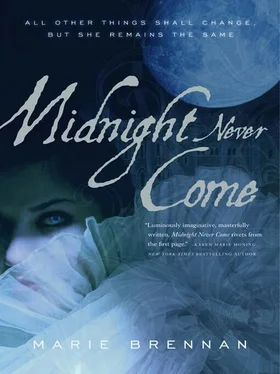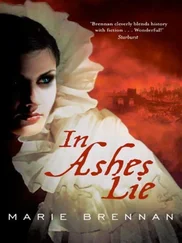Elizabeth had turned away to pace again; now she spoke abruptly. “What are your intentions toward my court?”
This was the true purpose of the meeting, the reason why “Mistress Montrose” had made a visit to Windsor Castle. Deven and Lune had talked it over before coming, but neither could guess what answer Elizabeth wanted to hear. All they could offer was the truth.
“’Tis a delicate balance,” Lune said. “Invidiana interfered too closely, appropriating your actions for her own ends, and treading upon your sovereign rights. I have no wish to imitate her in that respect. But we also have no interest in seeing England fall to a Catholic power. I do not speak for all the faerie kingdoms, but if there is need of defense, the Onyx Court will come to your aid.”
Elizabeth nodded slowly, evaluating that. “I see. Well, I have had enough of pacts; I want no swords in stones to bind us to each other. If such a threat should arise, though, I may hold you to your word.”
Then she turned, without warning, to Deven. “As for you, Master Deven — you offered to free me from that pact, and so you did. What would you have of me in return?”
His mind went utterly blank. How Colsey would have laughed to see him now, and Walsingham, too; he had come to court with every intention of advancing himself, and now that his great opportunity came, he could not think what to ask. His life had gone so very differently than he expected.
Kneeling, he said the first thing that came into his head. “Madam, nothing save your gracious leave to follow my heart.”
Elizabeth’s response was cool and blunt. “You cannot marry her, you know. There’s not a priest in England that would wed you.”
John Dee might do it, but Deven had not yet worked up the courage to ask. “I do not speak only of marriage.”
“I know.” Her tone softened. Deep within it, he heard the echo of a quiet sorrow, that never left her heart. “Well, it cannot be made official — I would not fancy explaining it to my lords of the council — but if our royal cousin here finds it acceptable, you shall be our ambassador to the Onyx Court.”
He could almost hear Lune’s smile. “That would be most pleasing to us.”
“Thank you, madam.” Deven bowed his head still further.
“But there is one difficulty.” Elizabeth came forward and put her white fingers under his chin, tilting his head up so he had no choice but to meet her dark, level gaze. “’Twould be an insult to send a simple gentleman to fill such a vital position.” She pretended to consider it, and he saw the great pleasure she took in this, dispensing honors and rewards to those who had done her good service. “I believe we shall have to knight you. Do you accept?”
“With all my heart.” Deven smiled up at one of his queens, and out of the corner of his eye, saw his other queen echo the expression.
It was a divided loyalty, and if a day should come that Elizabeth turned against Lune, he would regret occupying such a position.
But he could not leave the faerie world, and he could not leave Lune. So together, they would ensure that day never came.
RICHMOND PALACE, RICHMOND: February 8, 1603
The coughing never went entirely away anymore. They sent doctors to pester her; she mustered the energy to drive them out again, but every time it was harder. The rain beat ceaselessly against the windows, a long, dreary winter storm, and it was easy to believe that all the world had turned against her. She sat upon cushions before the fire, and spent many long hours staring into its depths.
Her mind drifted constantly now, forgetting what it was she had been doing. Cecil came occasionally with papers for her to sign; half the time she was surprised to see it was Robert, William’s hunchbacked little son. The wrong Cecil. Burghley, her old, familiar Cecil, had died… how long ago now?
Too long. She had outlived them all, it seemed. Burghley, Walsingham, Leicester. Her old enemy Philip of Spain. Essex, executed on Tower Hill — oh, how he had gone wrong. She could have handled him differently, perhaps, but when all was said and done he would never forgive her for being an old woman, too proud to give in, too stubborn to die. She was approaching seventy. How many could boast reaching such a great age?
She could think of some, but her mind flinched away. Those thoughts were too painful, now that illness and the infirmity of old age were defeating her at last.
“But I have done well, have I not?” she whispered to the fire. “I have done well. ’Twas not all because of her.”
She glanced behind her, half-expecting to see a tall figure in the shadows, but no one was there. Just two of her closest maids, keeping weary vigil over their crabbed old queen, periodically trying and failing to convince her to go to bed. She looked away again, quickly, before they could raise their incessant refrain again.
Sometimes she could almost believe she had imagined it all, from her visitor in the Tower onward. But no — it had been real. Invidiana, and all the rest.
So many regrets. So many questions: What would have been different, had she never formed that pact? Would the Armada have reached the shores of England, bearing Parma’s great army to overrun and subjugate them beneath the yoke of Spain? Or would she never have gotten that far? Perhaps she would have died in the Tower, executed for her Protestant heresy, or simply permitted to perish from the damp cold there, as she was perishing now. Mary Stewart might have had her throne, one Catholic Mary to follow another.
Or not. She had survived thirteen years without Invidiana, through her own wits and will, and the aid of those who served her. She was the Queen of England, blessed by God, beloved of her people, and she could stand on her own.
“And I have,” she whispered, her lips moving near-soundlessly. “I have been a good queen.”
The rain drumming against the windows made no reply. But she heard in it the cheers of her subjects, the songs in her honor, the praise of her courtiers. She had not been perfect. But she had done her best, for as long as she could. Now the time had come to pass her burden to another, and pray he did well by her people.
Pray they remembered her, and fondly.
Gazing into the fire, Elizabeth of England sank into dreams of her glorious past, an old woman, wrinkled and ill, but in her mind’s eye, now and forever the radiant Virgin Queen.
I owe a great debt of gratitude to the many people who helped me research this novel. During my trip to England, I was assisted by the following wonderful volunteers: from the Shakespeare’s Globe Library and Archives, Victoria Northwood; from the National Trust, Kate Wheeldon at Hardwick Hall; and from Historic Royal Palaces, Alison Heald, Susan Holmes at the Tower of London, and Alden Gregory at Hampton Court Palace. (The rooftop scene is his fault.)
I’m also grateful to Kevin Schmidt, for the astrology in Act Three, and to Dr. William Tighe, who taught me everything I know about the Gentlemen Pensioners, and mailed me his dissertation to boot. He is not to be blamed for anything I got wrong.
Finally, I have to thank Kate Walton, for needing someone to keep her awake on a late-night drive to the airport back in June of 2006. It was the first of many fruitful midnight conversations about this story, and it wouldn’t have been the same without her.
EXTRAS


Perry Reichanadter
MARIE BRENNAN holds an undergraduate degree in archaeology and folklore from Harvard and is now pursuing a PhD in anthropology and folklore at Indiana University.
Читать дальше














